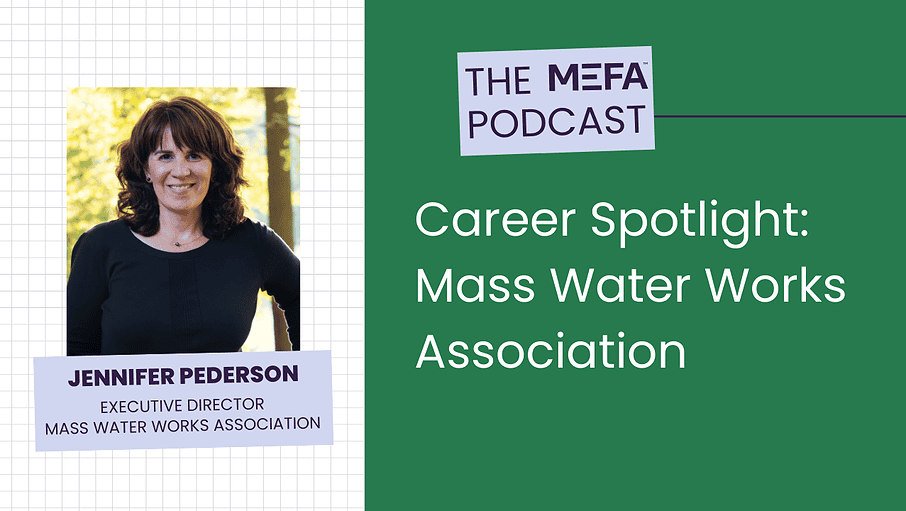

Resources Mentioned in this Episode
Please note that this transcript was auto-generated. We apologize for any minor errors in spelling or grammar.
Jonathan Hughes: [00:00:00] We’ve been reading about the need for more plumbers, more electricians, more carpenters. Would you also count the municipal water workers in with that group?
Jennifer Pederson: I certainly would. And so we in our industry, it is an aging industry. We have more than half of our licensed operators over the age of 50, which is quite scary when you think about it.
There are about 2,500 operators in the state. Who hold these licenses. And knowing that half of them are over the age of 50 really concerns us in the next, 10 to 15 years about who is going to backfill those positions and operate these systems. We are fortunate in our industry to have a number of various careers.
Jonathan Hughes: Hi everyone. And welcome to another episode of the [00:01:00] MEFA Podcast. My name is Jonathan Hughes. And that was our first guest on the show today. Jennifer Pederson. She’s the executive director of the Mass Waterworks Association, and this is very exciting to me. We’re going to be doing something on the show today that I’ve been looking forward to doing for a long time, and that is to highlight specific careers, industries, and fields, and specifically non college pathways.
That is, good jobs, industries in which you don’t necessarily need a college degree. So we have Jennifer here to talk about municipal waterworks, and she’s going to highlight that for us. But our second guest on the show today is going to tell his story as a municipal water worker who entered the field right out of high school.
Now you’ll hear from me later on, but let’s let our guest introduce herself.
Jennifer Pederson: My name is Jennifer Pederson. I’m the Executive Director of Mass Water Works Association. We are a non profit that caters to the drinking water industry, [00:02:00] and I have been the executive director for almost 18 years.
Jonathan Hughes: Thank you very much. I’m really excited to have you on the show. And we had a few discussions in the lead up to you being on this show about what we’re going to talk about and how this relates to everything that we do. And in the course of those discussions, it became apparent that I knew very little about the public water supply in Massachusetts, but a lot of people probably don’t, they probably know the same thing that I do, which is that I do.
You turn on the faucet and the water comes out. So if you could give me once again and everybody else That might have a similar level of knowledge, a simple explanation of the public water system and how, you do turn on the tap and the water comes out.
Jennifer Pederson: I would be happy to. I think you are not alone in not understanding where your water comes from. A lot of people just take it for granted. And so a public water system is a collection [00:03:00] of sources and pipes. that bring clean drinking water to people’s homes and businesses. And the source of the water can either be a ground water well, so a well dug very deeply into the earth that extracts water out of it. Or it can be a surface water system like a reservoir or taking water off of a river.
It all goes through a treatment plant in that case and through the pipes that come to your house and then in through your own plumbing system. And so you turn on the water and there it is.
Jonathan Hughes: And just how much work, if you can give us an idea of that, what kind of things go into making sure that, this water is clean and drinkable and good for everybody to ingest? What goes into that?
Jennifer Pederson: Water systems are governed by a lot of laws, both federal and state laws, and so we have to abide by those laws. And those laws set a certain quality criteria to make sure that water is safe, called the Safe [00:04:00] Drinking Water Act. So everyone in the nation who’s getting public water has to comply with that law.
And so we have to do monthly tests. to ensure that water is good sometimes more frequent sometimes less frequent if you have a really good source, but there are lots of water quality sampling that happens and then, public water systems really are a 24/7 operation every public water system has to have two licensed operators at a minimum.
Many have more, but those folks are responsible for making sure that the water is clean and safe and is coming to your tap. If there were a water main break in the middle of the night, those folks would be out there in the street. Uncovering that water main break, fixing it, making sure that you have water in the morning when you need to shower and make your coffee.
And so there’s a lot of work that goes in behind the scenes that people don’t see unless say there is a water main break and you’re without water. But it really is a 24/7 operation and very dedicated [00:05:00] folks who are making sure that water is clean and safe for you to drink.
Jonathan Hughes: Can you give everybody just an idea of-
Jennifer Pederson: As I said, every water system needs a minimum of two licensed operators, so those licensed operators, they need to take training, they need to keep up on training and they need to pass a certification exam and apply for a licensed water system. through the state. And so our organization does the initial training that they need to be able to sit for those grade two and higher licenses.
There are four grades of license in drinking water. So we provide that education and training. Think of it like a college level course. It’s a 12 week course the students learn all about the water system from source to tap, and they learn about those rules that govern water systems, and then they take our in house exam and they have to pass that class with a minimum of a 70, and then they are allowed to sit for the state exam, and then once they pass the state exam, And they apply for the license, [00:06:00] then they need a certain amount of continuing education credits every two years to keep up on that license. So the state wants to make sure that those operators know about new rules about anything changing with technology and that sort of thing. So our organization provides those classes. We also do a lot of advocacy on behalf of water systems. As I said, there are those laws that, that water systems have to abide by.
And so Mass Waterworks. does pay attention to changes in those laws, make sure the water systems know about them. We provide the voice of those water systems in those conversations about laws that are changing or rules, regulations that are changing. So that’s the role our organization plays. We are membership based and so our members pay to be part of our organization and get that benefit of the work we do on behalf of the industry.
Jonathan Hughes: One of the reasons that I’m happy to have you on, and this is something that we’ve wanted to talk about for a while, is to highlight [00:07:00] career pathways that folks might not be aware of, specifically those that may or may not require a college degree.
So towards that end, we’ve been reading about the need for more plumbers, more electricians, more carpenters. Would you also count the municipal water workers in with that group.
Jennifer Pederson: I certainly would. And so we in our industry, it is an aging industry. We have more than half of our licensed operators over the age of 50, which is quite scary when you think about it.
There are about 2,500 operators in the state who hold these licenses. And so knowing that half of them are over the age of 50 really concerns us in the next, 10 to 15 years about who is going to backfill those positions and operate these systems. We are fortunate in our industry to have a number of various careers.
So we [00:08:00] do have college educated folks mainly working, say, for consulting engineers who are doing water system design treatment plant design, that sort of thing. But we also have jobs for folks right out of high school. And those are our operators, our laborers could be folks working at any part of the utility.
The minimum for a license in Massachusetts is that you have a high school diploma or an equivalent. And so it is a great opportunity for folks who may not be wanting to go to college to look at water as a career. And really we can find a place for anyone who has an interest within the water sector.
We have need for computer folks. Our systems are becoming more automated. And so folks that have interest in programming and computer applications they are needed from both the automation standpoint, but also for computer billing and, system functions. We have [00:09:00] folks. For customer service.
So when you call your water utility, someone answers the phone, you have questions. Those are not jobs that require a degree. Certainly if you have a degree you’re not excluded, but they are opportunities for anyone who has an interest and a passion to serve the public to really get into the water sector.
Jonathan Hughes: So you mentioned you’re an aging industry and, you’re looking to interest more young folks into considering water as a career tell me what are you doing to attract those students or to get in front of those young people?
Jennifer Pederson: We’re fortunate in Massachusetts that several of the vocational technical high schools have environmental science and technology programs.
And so those high schools within that curriculum do have a component that looks at water and wastewater. So we, for instance, have been working with Minuteman technical High School in Lexington. They have an excellent program and they are, teaching the students the drinking water curriculum.
[00:10:00] Those students, if they’re successful within their own coursework, are able to take the state exam, and we’ve had a couple of instances where we have had students graduate with even a grade two treatment license, which is really just wonderful to see. And and so there are other high schools that are doing that.
And we are certainly willing to provide guest speakers and help them organize field trips to get into water treatment plants, also to make connections for co ops and internships. So those students get some practical knowledge. And we’ve been doing that for probably the last 15 years and and are excited to continue that work.
We are also this year making a concerted effort to participate in career fairs at high schools and colleges. And so we’ve been to probably eight or nine this year just to make sure that those high school students are aware of these career opportunities.
Jonathan Hughes: To those folks who enter the program, maybe right out of high school can you tell me what sort of opportunities [00:11:00] for career development or, how does a career in water branch out to other things perhaps or within the field?
Jennifer Pederson: So as I said, the minimum is the high school education. And so once you have that, the board of certification, which oversees the operators, didn’t want there to be a barrier for those folks who were motivated to get a license. And so at the very lowest level of license, that grade one license, anyone can take that exam without any additional coursework.
So that provides anyone who has an interest in able to study for and pass that exam to get that license. Having that grade one license shows a lot of motivation and so for a prospective employer seeing that they are very excited and many of our water utilities are very interested in professional development to get folks those higher level licenses and so in many cases, they once they [00:12:00] hire you, they will pay for you to do the additional training you need to get the grade two license to maintain the license.
You should also say that if you’re working in a water distribution system, so out in the street with pipes and pumps and valves and that sort of thing, you may need a hoisting license, a CDL license, they pay for you to take that training and get those licenses. They will hire folks who show motivation and a willingness to learn, and they are not afraid to invest in those folks to make sure that they have the certifications they need to do their jobs.
So I think I would encourage folks if they’re interested to, to take that grade one exam, and there are study materials out there. There are. Courses available, although not required, you certainly could sit for, say, a five or six week course to get a better understanding and then go in and take that exam.
So I think, that’s the main [00:13:00] thing is the motivation and wanting to to learn, and these are stable careers, water can’t be outsourced we are needed 24/7, and so it really is an opportunity to have a stable career, most of our public water systems are municipal in nature we do have some private water companies in Massachusetts that are also looking for operators.
So if you want to work for a private entity, you can, but if you want a good paying stable municipal job with benefits and a retirement, that is it’s a great career path and one with some stability.
Jonathan Hughes: And so what students do you think would be attracted to this type of opportunity? If you’re, if you, for example, if you like science or if you like building, what, who should be thinking about making water their career?
Jennifer Pederson: I would say that we definitely see a lot of folks who have mechanical aptitudes. So if you like to tinker with things and pull things apart, Distribution system [00:14:00] work would be great. To pursue. We do have folks who have degrees in chemistry or, work in labs, analyze the water. Science is certainly important and interest in science and interest in public health.
An interest in, making sure that folks have services that they need. That public servant attitude, that you want to help your community, you want to make things better. If you have an interest in the environment, our water system operators are environmentalists.
They can’t do their job without those clean drinking water sources. There are in larger systems, especially, there are opportunities for forestry for watershed protection. So we have folks who have an interest just generally in an environmental field and that makes a great fit for water.
Jonathan Hughes: What would you say to someone who’s hearing this and is interested and wants to pursue learning more about a career in water? What should they do?
Jennifer Pederson: Sure. So we have information on our website, [00:15:00] MassWaterWorks.org, that kind of lays out how you can become a drinking water operator. You can see the types of courses that are available.
I’m always happy to talk to anyone who’s interested in this field and have a conversation. See if it’s a good fit. There are other organizations out there also doing training. If you Google water in Massachusetts, you’ll probably find a lot of great information. But I would. I encourage you to start at our website, see the pathway to becoming a drinking water operator, and feel free to reach out to me if you have particular questions.
Happy to have interested individuals even do informational interviews with some of our water systems. Those who have, come through the ranks and have some experience to share and we’re all happy to reach out and have conversations with people who are interested.
Jonathan Hughes: All right, Jennifer Pederson, thank you so much for being here.
I really learned a lot and I really did enjoy this very much. Thank you.
Jennifer Pederson: Thank you. And thank you for highlighting water careers. Appreciate it.[00:16:00]
Jonathan Hughes: All right. Thanks so much, Jennifer, for that. I learned so much from that talk, and you may remember Jennifer talking about engaging students and hoping to draw them to a career in water. But she also introduced me to someone who did just that. We chatted briefly about his experience. So let’s hear from him now.
Carter Gruca: My name is Carter. I’m 20 years old. I’m a drinking water treatment operator at the City of Fitchburg Water Department. I treat water so that it is clean and drinkable for people in the city to drink. So that can include doing operation and maintenance on a bunch of equipment that’s involved. It can involve lab work and water quality sampling. And it can also involve recording data and reporting it to regulatory agencies.
Jonathan Hughes: How long have you been doing this?
Carter Gruca: As of June, it’ll be two years.
Jonathan Hughes: Do you enjoy doing it?
Carter Gruca: Yes. Yeah, I like it a lot.
Jonathan Hughes: So how did you get [00:17:00] interested?
Carter Gruca: I went to Minuteman Vocational High School in Lexington and they have an environmental science shop. Out of the like 18 or so different jobs, that’s the one I ended up picking junior and senior year of high school junior year. A lot of the curriculum is wastewater treatment and then senior year. A lot of the curriculum is drinking water treatment.
And it just happens to be something like, I really gravitated towards. I really liked. We mostly in class went over the theory of it. Learning about it there. It was hard to imagine yeah, but what do they do at work? But we would also take tours of the places and it was really cool to see.
So I liked the concepts and we went to the places and those were also cool. So I just was exposed to it at school.
Jonathan Hughes: Now, something I heard was that you got your certifications in doing this work before you graduated high school?
Carter Gruca: Yeah. So I have a level four drinking water treatment license. I did not- the fourth is the highest that you can have. I didn’t get that one in high school. I [00:18:00] got the level one and the level two. So that was senior year of high school. We learned about drinking water treatment and then, that class also. The, it’s a big, the board for the certification of drinking water operators the class that we took at school was like, thumbs up.
That’s that counts as like a basic course. So you can take then that second level license. While in school, I was able to go take those tests and those tests are just like 106 dollars to sign up for. There are 110 multiple choice questions about a bunch of the theory and there’s also some math on there, but it was really just that I learned about in school.
I paid 106 bucks to take some tests. If you get there’s 110 questions, only 100 of them account. I don’t know what those other 10 are doing there, but only 100 of them account. And you need a 70 pass. So you get a 70 on that, they print out your results for you, and then you just go online, apply, it’s 70 bucks to do that.
So I think to get one license, that’s [00:19:00] like around 180 bucks. And so to get those two licenses, whatever 180 times two is $300 something. And so I was hired with that level two license, so that’s less than 400 bucks to get into a job like that.
Jonathan Hughes: And so this was, those two licenses were what you got upon graduating high school, by the time you graduated high school.
Carter Gruca: Yeah, I did also have our sophomore year of high school, we did OSHA 10 training. So that’s just like construction, general construction safety. That is also something that my job likes me to have. And then I also have, I have a wastewater treatment license as well, that I got junior year. That was, again, I just learned about that in school.
That was another $106 test. They printed that right out. I applied for it. It was the same sort of process.
Jonathan Hughes: This is in addition to the two that you had. That’s in addition.
Carter Gruca: And then I also, this is the last one, I also have an OSHA [00:20:00] 40 HAZWOPER certification. And HAZWOPER, it’s a weird acronym. It stands for Hazardous Waste Operations, I believe.
There’s the wastewater, the hazardous waste, general construction safety, and drinking water. And I got all those in high school.
Jonathan Hughes: Now, were you always interested in science, or?
Carter Gruca: Yeah, not always this type of science. I was more of like an animal guy.
Jonathan Hughes: Did this sort of surprise you that you were interested in this?
Carter Gruca: Maybe a little bit because I actually, I went to the technical school. I thought I wanted to be a teacher, and so they have an early education shop. I tried that out and discovered I actually really hated it. So I was like, scrambling. I’m like, what do I do now? And that, environmental science, something about it just called to me. It was a cool science. I also liked all the people there.
Jonathan Hughes: And was seeing that it was, a good career. Was that very powerful to you?
Carter Gruca: Yeah it definitely is a really good career because for I work for a municipality, right? Not everywhere. There are some private drinking water [00:21:00] stuff, but my job, I’m in a union.
I get a pension, I have really good health insurance. And then the other thing about it is it’s water. Everyone has water. I could go anywhere and treat water, it’s, and it’s not something that’s going to go away. You’re always going to need water. So it is one of the most stable things that I can think of, and that does definitely appeal to me,
Jonathan Hughes: One of the things that we are looking forward to highlighting in this conversation is the fact that, depending on your role or what you don’t necessarily need a college degree to have this good career. How did you feel about that? Was that a plus to you?
Carter Gruca: Yeah, it definitely was a plus. I didn’t need a college degree. Because I’m really I didn’t think that hard about if I want to go to college or not, because it was a maybe for me, and it’s really expensive. So I’m like, I’m not going to spend all the money on a maybe.
So it was nice I just happened to go to school, happened to have these licenses. Yep, I’ll try that out under that debt.
Jonathan Hughes: Do you think that has served you well?
Carter Gruca: I think so, yeah, definitely.
Jonathan Hughes: [00:22:00] Are there other people your age that you interact with at your job?
Carter Gruca: There’s one. Everybody else is at least a decade older than me, usually more than that.
But there’s 1 other person my age there. So that was actually interesting starting because I was like, man, I wonder if they just think I’m like, some dumb kid I promise. I know what I’m talking about. But, also, it was my 1st year going into it. I don’t have that.
Experience to back up the theoretical knowledge I had maybe. So it was definitely, after probably after 1 year, everyone’s yeah he’s. I don’t know everything, but I hold my own.
Jonathan Hughes: Were they welcoming to you?
Carter Gruca: Oh, absolutely. Yeah. So not to pat myself on the back, but it’s impressive when they’re like, wow, this kid has these licenses. I didn’t know about this when I was this age, so I haven’t been met with negativity by them. It’s really positive.
Jonathan Hughes: And is this something that you would recommend to somebody else if they were thinking about doing it?
Carter Gruca: I try to get my- I don’t try [00:23:00] to get my friends to do it all the time Like if I talk about work like they get tempted, and I’m like, oh, it’s not hard like $100 test It’s multiple choice Just study.
I’ll help you study. I do really think that If it’s something you even, want to get into, if you don’t know what else you want to do it’s definitely worth doing because it’s, again, water’s not going anywhere, it’s a public service, like it feels purposeful and meaningful.
And then also like I go to work and there’s some routine stuff, which is nice because Oh, I know what I’m doing. I just do this. But then also there’s a lot of stuff that changes and challenges and problem solving, and that keeps you, entertained, maybe stressed if there’s a big issue, keeps you moving. So I do think it’s a really good, place to be.
Jonathan Hughes: That was great. Thank you so much, Carter. And I really do appreciate you taking the time to talk to us. Thank you for being on.
Carter Gruca: Yeah, thank you. I appreciate the invitation.
Jonathan Hughes: Thank you so much to Carter and to Jennifer. I love doing this show and I really hope we can get some folks to consider this pathway as we continue to highlight all the [00:24:00] different options available to people and the needs of employers as well. So thank you, Jennifer, and thank you, Carter, and folks I’m going to say it again if you like the show and you want to hear more from us on planning, saving, and paying for college and career readiness, then follow the show and you can find us wherever you get your podcasts and please review us.
And also please tell your family and friends who may be looking for information on the topics we cover. Thanks to Shaun Connolly our producer, AJ Yee, Lisa Rooney, and Lauren Danz for getting the show posted so that you can hear it. I’ll be back next week, but until then, my name is Jonathan Hughes and this has been the MEFA Podcast. Thanks.












